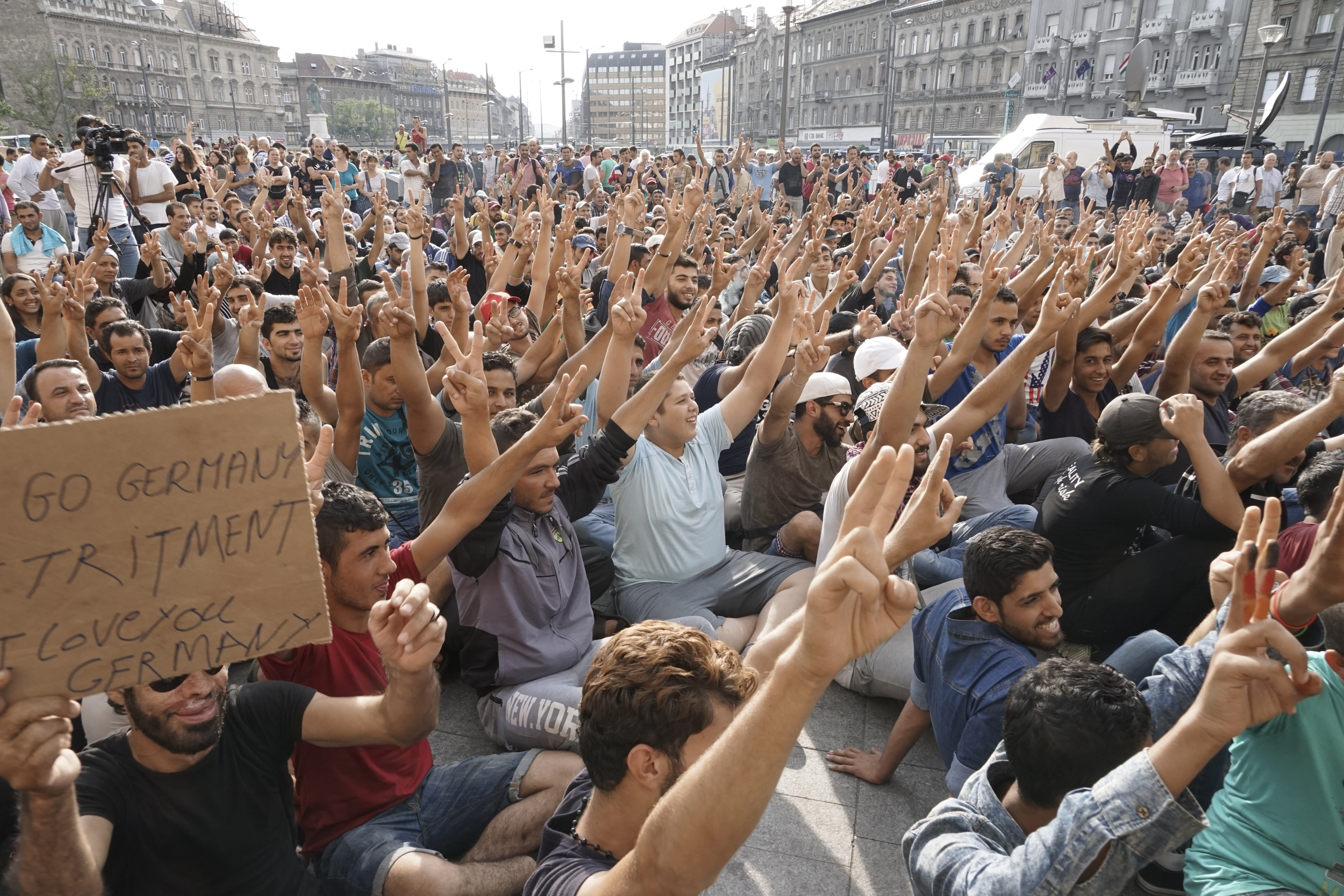The Clash of “Isms” – When Racism Wins
 Syrian refugees in front of Budapest Keleti Railway Station
Syrian refugees in front of Budapest Keleti Railway Station
It was in the late 2000s that sexual violence became a core focus of the media in Europe. In her article on “Sexual Violence and the Language of Border Control”, Miriam Ticktin addresses this issue by illustrating the situation of the French banlieues (suburban areas), where gang rapes have been steadily increasing in a phenomenon that became known as Les Tournantes. Although gang rapes had been taking place in the region for many years previously, as Laurent Mucchielli showed through his studies (872), they only became the focus of public and media attention when the perpetrators could be pitted as members of a mainly Maghrebian or North African demographic. Ticktin deplores this as an example of “fighting sexism with racism” (865) and calls for a deeper analysis of the issue. She believes sexual violence has wrongly been implicated in the context of closing borders as well as increased xenophobia and exclusion of North African and Muslim males “as barbaric and uncivilized, and now as violators of women’s human rights” (864-865).

Photo by Philipp on Flickr Creative Commons
It almost seems like history is repeating itself as many popular media sources have taken a strict anti-Muslim stance following the sexual assaults that took place on New Year’s Eve in Cologne, Germany, and other areas throughout Europe. After it was revealed that up to 21 out of the 34 suspected assaulters were asylum-seekers, circulating rumors intensified about the supposed direct link between the increased crime rate in Germany and the growing influx of refugees, particularly young Arab males. Anti-immigration groups that have been fighting for a closure of their nation’s borders for months are now using the assaults as a pretext to further support their position. Even Angela Merkel, who has traditionally been largely pro-immigrant, has called for a change to criminal laws, promising to make deportation faster and easier for asylum-seekers who have received a jail sentence. Deportation seems to be the only solution for these criminals, as German taxpayers are refusing to let their money be used towards the jailing of foreigners who do not have German resident status. Germany, followed by other European countries, is now exhibiting a much more powerful desire to maintain national public order, fueling the idea with extreme Islamophobia and far-right conservatism. In most recent news, Angela Merkel has seen her approval ratings decrease significantly, showing a clear pattern of growing dissent towards immigrants among German citizens.
Federal Interior Minister Thomas de Maizière made sure to disprove the existing rumors by asking the Bundeskriminalamt (also known as BKA, or Federal Criminal Police of Germany) to submit to him a report of crime statistics in 2015, addressing the refugee issue in particular. According to this report, crime rates are indeed quite high among asylum seekers. What the report also shows, however, is that the crimes reported are most often in areas of theft (33 percent), counterfeiting or fare evasion (34 percent), and other similar crimes. Meanwhile, less than 0.1% were considered to be crimes of a sexual nature. These statistics are not far off from those that were published in 2014 for all of Germany. According to the BKA, in 2014, there were 2 440 060 theft crimes, or 40.1% of the total crimes of that year, while crimes of fraud made up 15.9%. Rape or aggravated sexual assault made up 0.001% of all crimes. Although this seems like an extremely low number, it is important to remember that many crimes of sexual offense are often not reported. Furthermore, a pre-existing racism in Germany and a close surveillance of refugees may have led to a biased increase in reporting of such crimes due to the recent influx of Arab refugees. Other BKA reports have also shown that crime is in fact increasing against refugees, which might be explained by a growing hatred of asylum-seekers. Minister de Maizière pointed particularly to the need to stay away from generalizations and stereotyping of refugee populations as criminals, as the majority of them come to Germany looking for peace and protection.
It is true that there have been a large number of reported cases of sexual assaults by refugees, although it is unclear whether the illusion of an increase in such crimes is simply due to an overwhelming prejudice against the Arab world in mainstream media. Furthermore, these crimes are often reported from within refugee facilities, where overcrowding and lack of infrastructure has meant that men and women share all spaces, and women are left with very few private areas, making them highly vulnerable to sexual offense. Anna Wizorek, writer and feminist activist, reveals her disappointment towards the strong anti-refugee sentiments that have surfaced after the attacks. She remarked that “we are only focusing on sexism and sexual assault when it is perpetrated by men of color. And that sets a wrong focus on the problem that we actually have to talk about”, effectively repeating what Ticktin phrased as “fighting sexism with racism”.
The issue at stake is much larger than the threat of males of Muslim origin “invading” Europe, as some might describe it. In the case of Les Tournantes, the highly stereotyped Arab males were not the sole culprits but the media failed to keep an objective perspective when it chose to portray them as the only perpetrators of crime in French neighborhoods. In the case of sexual assaults occurring today, German nationals and other Europeans or Americans can be found equally guilty as those few Arab males who have now given a new face to refugees. In facing the issue of the recent events of Cologne, it is important to treat the two existing issues as separate: sexism, for one, to promote a culture of consent and prevent further attacks on women; racism, on the other hand, to create an atmosphere of acceptance and abandon existing prejudices that will otherwise have a highly negative impact on those refugees who are truly looking for a better life. Unless higher protection of women is put in place and public awareness of the multiethnic nature of crime is increased, there will be no guarantee of safety for women in Germany, or any other country.
